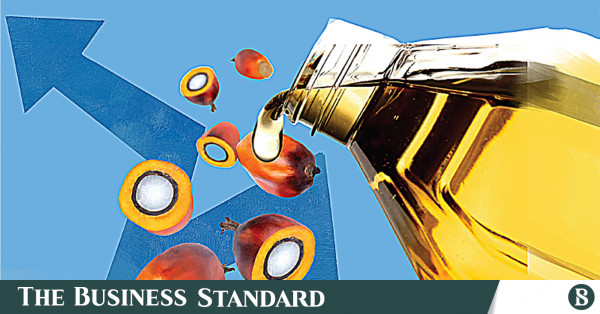Palm oil price rises Tk850 per maund


Lack of smooth LC opening and higher booking prices have been blamed
Infograph: TBS
“>
Infograph: TBS
The price of palm oil, one of the key edible oils, has risen sharply in the domestic market as in the last one and a half months, wholesale prices for palm oil have surged by Tk850 per maund.
Traders say the sharp rise is due to difficulties in opening letters of credit (LCs) for imports and higher booking prices in the international market, leading to an abnormal price hike.
Khatunganj, the country’s main wholesale market for consumer goods in Chattogram, saw palm oil sold at Tk5,700 per maund (37.32 kg) on Sunday.
A month ago, in the third week of August, the price was Tk4,850 per maund. This reflects a Tk850 rise in just one month.
The spike in wholesale prices has also affected retail markets, where consumers are paying Tk22-24 more per litre of palm oil. Until the last week of August, palm oil was sold for less than Tk135 per litre.
However, in the past three weeks, prices have steadily risen, and grocery shops are now selling it at Tk 148-150 per litre.
Abdur Razzak, a Khatunganj-based edible oil trader, said the rise in palm oil prices began towards the end of August.
He added, “Importers, particularly mill owners, have raised the price of palm oil, leading to price instability in both wholesale and retail markets. There is no shortage of palm oil in the market, but rising booking prices in the international market and the suspension of exclusive LC facilities for S Alam Group by banks have disrupted the palm oil market.”
Pradip Karan, deputy general manager (Sales) of City Group, a leading importer, told The Business Standard that since 5 August, banks have not been able to open LCs for imports as smoothly as before.
Shipping charges have also gone up, contributing to the overall price hike of this essential commodity, he added.
According to wholesale edible oil traders, neither the government nor import companies have adjusted the prices of edible oil for a long time, causing the palm oil market to become volatile.
Mill owners have reduced the volume of supply orders, commonly referred to as delivery orders, leading to an artificial crisis in the market.
As a result, traders have shifted their focus towards purchasing palm oil and super palm oil instead of soybean oil, despite the higher prices. However, as mills are unable to meet the growing demand with sufficient supply, palm oil prices continue to rise.
Seeking anonymity, an official at an edible oil importing and refining company said due to banking difficulties, the volume of imports has decreased.
“Even though supply orders are arriving at the mill gates, the supply is insufficient. If stock runs out by next week, mill operations might be halted. S Alam Group has already stopped palm oil imports due to a lack of banking support.”
In contrast, soybean oil prices in the domestic market have remained stable for the past few months.
Typically, there is a price difference of Tk1,000-1,500 per maund between palm oil and soybean oil. However, the recent surge in palm oil prices has brought it close to the price of soybean oil.
Currently, soybean oil is being sold at Tk5,900-5,920 per maund, down from Tk6,000 two weeks ago.



